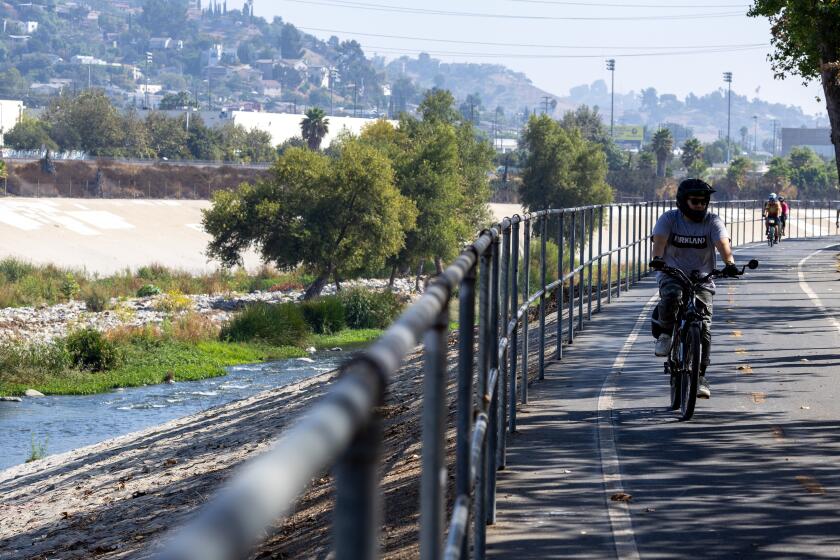McManus: The NRA has won
Politicians haven’t always been allergic to gun control, not even Republicans.
In 1968, after the assassinations of John and Robert Kennedy and the Rev.Martin Luther King Jr., Congress — on a bipartisan vote — outlawed guns sales to felons and the mentally ill. In 1993, when Congress passed the Brady bill requiring background checks for gun purchasers, former President Reagan, who narrowly escaped assassination in 1981, was among its supporters.
In 1994, when Congress passed a ban on assault weapons, 10 Republican senators supported the provision. And as recently as 2002, when Mitt Romney ran for governor of Massachusetts, he declared himself strongly in favor of “tough gun laws.”
“I believe they protect us and provide for our safety,” Romney said. Two years later he signed a state-level assault weapons ban that remains in force.
But that was a decade ago. This week, days after a gunman with an assault rifle killed 12 moviegoers in a Colorado theater, neither Romney nor President Obama raised the now-radical notion of reviving the federal assault weapons ban, which expired in 2004. Even the ban’s principal author, Sen. Dianne Feinstein (D-Calif.), admitted that it was a lost cause for now.
Feinstein blamed the National Rifle Assn. and other gun rights groups for blocking new laws. “They pour a lot of money [into election campaigns], and some people lost office after they voted for the legislation before,” she said.
But powerful lobbies and callow politicians aren’t the only impediments to stricter gun laws. Over the last two decades, public support for them has collapsed. In 1990, before the assault weapons ban, a Gallup poll found that 78% of Americans favored stricter regulation of guns. But that number has declined steadily ever since. Last year, Gallup asked the same question, and only 43% of those polled said they favored stricter gun laws.
The public doesn’t agree with the NRA that gun laws should be eased further — only 11% hold that view, according to Gallup. But on the core issue — the right to gun ownership with only minimal government oversight — the NRA has won the debate.
Social scientists have differing opinions about why public opinion has shifted so remarkably, but one likely explanation is that crime is down. Twenty years ago, when murder rates were high, sponsors of gun control legislation billed it as a way to help get guns off the street and reduce the murder rate. It’s not clear that gun control got many firearms off the street, but violent crime has declined sharply and, with it, some of the impetus for more laws.
Another probable reason for the shift is a precipitous drop in citizens’ confidence in the federal government. In 2011, Gallup found that only 43% of Americans said they trusted the federal government to handle domestic problems, the lowest ever recorded; 49% said they considered the federal government “an immediate threat to the rights and freedoms of ordinary citizens,” the highest ever recorded. When people are that suspicious of federal power, they’re wary of federal gun laws too.
Political polarization is also a factor. Gone are the days when the two parties could find middle ground on gun control. Pew Research Center polls found that from 2007 to 2012, the percentage of Americans who believed that controlling guns was more important than protecting gun rights fell from 59% to 45%. But most of that change occurred among Republicans; only five years ago, the GOP was closely divided on the issue, but now only about one-fourth of Republican voters call gun control a higher priority than gun rights. Among Democrats, by contrast, about two-thirds want gun control, and their views have hardly budged in 20 years.
That shift hasn’t been lost on the NRA. In an earlier day, the group made its mark by attacking vulnerable Democrats, such as then-House Speaker Tom Foley, who lost his seat in eastern Washington state after helping pass the assault weapons ban in 1994, and even presidential candidate Al Gore, who lost his native Tennessee in 2000.
But more recently, the NRA has focused on keeping Republicans in line, if only because there are so few conservative Democrats left to go after. Over the last two decades, Federal Election Commission records show that the NRA has spent almost $49 million on independent campaign expenditures, second only to the Service Employees International Union. And that kind of spending sends a message.
The NRA attacked Sen.Richard G. Lugar(R-Ind.) in his primary campaign this year, accusing him of “hostility toward our right to keep and bear arms” based on his support for the assault weapons ban. Lugar lost to a more conservative”tea party”candidate who won the NRA’s endorsement.
Like other Republicans, Romney has taken note of the NRA’s muscle. The presumptive Republican nominee signed his state-level assault weapons ban in 2004, but as soon as he began contemplating a run for president, he moved to the right. Romney quietly joined the NRA in 2006 and campaigned for the Republican nomination in 2008 as an unbending supporter of gun owners’ rights, a position blemished only by his awkward statement that he was merely an occasional hunter, and then for “varmints.”
“I do not support any new legislation,” Romney said that year. This year, the issue has hardly come up.
That absence of debate is the best evidence that the NRA has won the argument, at least for now. Obama represents a party whose voters are, on this issue, dissenters from the American majority. Most Democrats, especially urban Democrats, say they still want tougher gun laws, such as a renewed assault weapons ban that would outlaw the 100-round magazine that James Holmes allegedly used to kill the moviegoers in Colorado. But Obama wants to carry independent voters too, and he can read the polls.
More to Read
A cure for the common opinion
Get thought-provoking perspectives with our weekly newsletter.
You may occasionally receive promotional content from the Los Angeles Times.











